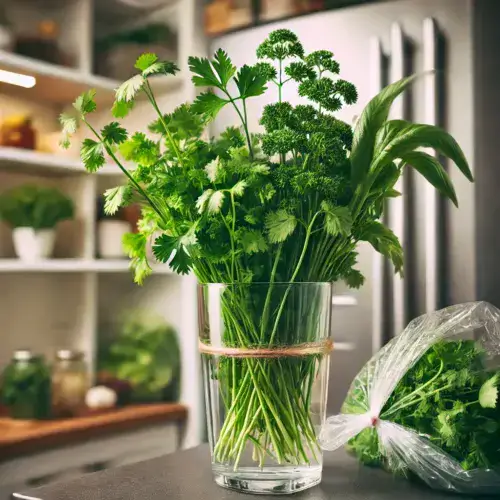
Fresh herbs are a must-have in any kitchen, adding flavor, color, and aroma to various dishes. Whether preparing a Mediterranean feast or a simple salad, herbs can elevate your culinary creations. However, one common challenge is keeping herbs fresh. Without proper storage, fresh herbs wilt, lose their vibrant flavor and spoil quickly.
This guide will walk you through the best ways to store fresh herbs to keep them looking and tasting their best for longer. You’ll use professional techniques to ensure your herbs remain fresh, flavorful, and ready to use whenever you need them. From delicate herbs like cilantro and basil to sturdy varieties like rosemary and thyme, these storage tips will help you maximize the shelf life of your herbs.
1. Why do Fresh Herbs Wilt and Spoil Quickly
Due to their high moisture content and delicate structure, fresh herbs are highly perishable. When exposed to air, heat, or excessive moisture, they break down quickly, resulting in wilting, discoloration, and a loss of flavor. It’s essential to control factors like humidity, airflow, and temperature to keep herbs fresh for longer.
Because they are more delicate, herbs like cilantro, parsley, and basil are particularly susceptible to wilting. Meanwhile, heartier herbs like rosemary and thyme can withstand harsher conditions but still need proper storage to maintain their flavor and texture. Following the proper storage methods for each herb type, you can extend their shelf life and enjoy fresh, vibrant herbs for longer periods.
2. How to Store Delicate Herbs in Water
Delicate herbs like cilantro, parsley, and basil are best stored in water, like fresh-cut flowers. This method ensures that they remain hydrated and fresh.
Step-by-Step Instructions:
- Trim the Stems: Begin by trimming the stems of your herbs slightly to allow better water absorption.
- Place in a Jar: Fill a glass jar or container with about an inch of fresh water. Place the herbs upright in the jar, ensuring the stems are submerged in water.
- Cover the Tops: Loosely cover the herb tops with a plastic bag to protect them from drying out.
- Refrigerate: Store the jar in the refrigerator, except for basil, which should be kept at room temperature for optimal freshness.
Important Tips:
- Water Maintenance: Change the water every 2-3 days to prevent bacterial growth and hydrate the herbs.
- Storage Duration: When stored correctly, delicate herbs can stay fresh for up to a week or longer.
This method works particularly well for herbs with soft stems, such as dill, mint, and tarragon. The water keeps the herbs hydrated, while the plastic bag helps retain moisture without condensation.
3. How to Wrap Sturdy Herbs in a Damp Towel
Herbs with sturdier leaves and woody stems, like rosemary, thyme, and sage, do better when wrapped in a damp towel. This method helps maintain the right moisture balance, ensuring the herbs don’t dry out or become too soggy.
Step-by-Step Instructions:
- Dampen a Paper Towel: Moisten a paper towel slightly so it’s damp but not soaking wet.
- Wrap the Herbs: Place your herbs in the damp paper towel, wrapping them securely but not too tightly.
- Store in a Plastic Bag or Container: Place the wrapped herbs in a resealable plastic bag or an airtight container.
- Refrigerate: Store the bag or container in the refrigerator’s vegetable crisper drawer.
Storage Duration:
This method can keep sturdy herbs fresh for up to two weeks. The damp towel provides a moisture buffer, keeping the herbs hydrated without making them soggy. Be sure to check the herbs every few days and replace the paper towel if it starts to dry out or becomes too wet.
4. Freezing Herbs for Long-Term Storage
If you have an abundance of fresh herbs and want to preserve them for future use, freezing is an excellent option. Freezing herbs can maintain their flavor for months and allow fresh herbs to be on hand year-round.
Step-by-Step Instructions:
- Chop the Herbs: Finely chop your fresh herbs, removing tough stems.
- Place in Ice Cube Trays: Fill each compartment of an ice cube tray with the chopped herbs.
- Add Water or Oil: Pour olive oil or water into each compartment, ensuring the herbs are submerged.
- Freeze: Place the tray in the freezer until the cubes are completely frozen.
- Transfer to Freezer Bags: Once frozen, pop the herb cubes out of the tray and transfer them to resealable freezer bags.
Storage Duration:
Frozen herbs can last up to six months, retaining flavor and freshness. This method is ideal for herbs like rosemary, thyme, oregano, and dill, which freeze well and maintain their essential oils.
5. How to Dry Herbs for Storage
Drying herbs is one of the most traditional methods of preserving them for long-term use. While drying changes the texture of the herbs, it intensifies their flavor, making dried herbs perfect for seasoning dishes.
Step-by-Step Instructions:
- Bundle and Tie: Gather herbs like rosemary, thyme, and oregano into small bundles and secure them with string or twine.
- Hang to Dry: Hang the herb bundles upside down in a cool, dry, and well-ventilated space. You can also use a food dehydrator to speed up drying.
- Wait for Complete Drying: Allow the herbs to dry completely, which can take a few days to a few weeks, depending on the environment.
- Store in Airtight Containers: Once dried, crumble the leaves off the stems and store them in airtight containers, away from sunlight and moisture.
Storage Duration:
Dried herbs can last several months to a year depending on the storage conditions. To maximize their shelf life, keep them in a dark pantry or cupboard.
6. Avoiding the Plastic Bag Mistake
Many people make the mistake of simply storing fresh herbs in plastic bags without any other preparation. This can lead to wilting and premature spoilage due to a lack of airflow and excessive moisture buildup. Herbs stored this way are more likely to rot within a few days.
Best Practices:
- Always wrap herbs in a damp paper towel or store them in water before placing them in plastic bags or containers.
- Avoid tightly sealing plastic bags, as this traps moisture and accelerates spoilage.
7. Bonus Tips for Storing Fresh Herbs
Here are a few extra tips to keep your herbs fresh for longer:
- Inspect Herbs Regularly: Check your herbs every few days and remove any leaves starting to turn brown or wilt to prevent them from affecting the rest of the bunch.
- Store in the Right Place: Basil should be stored at room temperature, while other herbs like cilantro, parsley, and mint do better in the fridge.
- Use a Herb Keeper: Consider investing in an herb keeper. These are designed to store herbs in water and have a lid that helps retain moisture and freshness.
8. Common Mistakes to Avoid
Mistake #1: Not Drying Herbs Properly
After washing herbs, always dry them thoroughly with a towel or salad spinner. Excess water can cause them to rot quickly.
Mistake #2: Storing All Herbs the Same Way
Different herbs require different storage methods. Delicate herbs like cilantro and parsley need water, while robust herbs like thyme and rosemary should be wrapped in a damp towel.
Mistake #3: Forgetting to Change Water for Herbs Stored in Jars
If you store herbs in water, you must change the water every 2-3 days to prevent bacteria growth.
9. Conclusion: Extend the Life of Your Fresh Herbs
Proper storage is the key to keeping your fresh herbs vibrant, flavorful, and ready to use. Whether you store them in water, wrap them in a damp towel, freeze them, or dry them, these methods can extend the life of your herbs and reduce waste. Avoid common mistakes like storing herbs in airtight
plastic bags without preparation, and follow the herb-specific tips to maintain freshness.
For more detailed tips and storage solutions, check out the link.
By applying these techniques, you’ll always have fresh, delicious herbs to enhance your cooking and elevate your dishes to the next level. Happy cooking!
How to Properly Store Fresh Herbs: Keep Them Fresh for Longer
Instructions
1. Store Delicate Herbs in Water
Delicate herbs like cilantro, parsley, and basil can be treated like fresh flowers. Trim the stems slightly, place them in a glass of water (with about an inch of water), and cover the tops loosely with a plastic bag.Keep them in the refrigerator (except for basil, which stays fresh at room temperature), and refresh the water every few days to maintain their freshness
2. Wrap Sturdy Herbs in a Damp Towel
Robust herbs like rosemary, thyme, and sage can be wrapped in a damp paper towel and kept in a resealable plastic bag or an airtight container. The damp towel helps maintain the right moisture level without making the herbs soggy, keeping them fresh for up to two weeks.
3. Freeze Herbs for Long-Term Storage
For long-term storage, freezing herbs is an excellent option. Finely chop the herbs and place them into ice cube trays. Fill the trays with olive oil or water and freeze. Once frozen, Once frozen, move the cubes to a resealable freezer bag. This method is perfect for rosemary, thyme, and oregano, which retain their flavor even after freezing.
4. Dry Herbs for Storage
Some herbs, like rosemary, thyme, and oregano, can be dried to preserve their flavor. Hang them upside down in a cool, dry place, or use a dehydrator. Once completely dried, store the herbs in an airtight container, away from direct sunlight. Dried herbs can last for several months when stored correctly.
5. Avoid Storing Herbs in Plastic Bags Alone
Storing fresh herbs in plastic bags without proper preparation can lead to quick wilting. The lack of airflow and excessive moisture can lead to premature spoilage. Always use either the water or damp towel method for best results.
Notes
Proper storage techniques can extend the life of your fresh herbs, keeping them flavorful and ready to use. Whether you store them in water, wrap them in a damp towel, freeze, or dry them, these steps will help keep your herbs fresh and vibrant, allowing you to enhance your dishes for longer.






